A community of immigrants from all over West Africa has grown into a permanent piece of the city’s cultural landscape.
On an unseasonably warm October evening, a group of Sierra Leonean men sat around a communal chafing dish of rice and cassava-leaf stew at Tasty African restaurant in Southwest Philadelphia, passionately discussing their country’s upcoming election. The walls, as one of the more vocal members of the party pointed out, were painted a bright red-orange, a clear sign of support for the country’s ruling party. He wore a bright-green tracksuit and running shoes: the colors of the opposition. They’d been talking for more than an hour, and the recently arrived food did little to quiet their animated but jovial debate. If anything, sustenance seemed to fuel it.
Ezzy Tholley opened the restaurant with his wife, Mimi Kamara, who runs the kitchen. He watched the discussion without comment, eating the same simple dinner as his more animated customers and translating for me between bites from Sierra Leonean Krio into English. He explained that, while they take these things seriously, the raised voices weren’t so much a sign of hostility as of intimacy.
A few months earlier, these same men had met here to follow the Freetown mudslide that, the news reported, took the lives of more than 400 people in the capital. Sitting at the entrance of the restaurant that night, one of them pulled out his phone to show me a picture of piled-up bodes, sent to him via WhatsApp from back home. The number of dead was almost certainly higher than the official count, he commented before heading inside to pick up a meal to go.
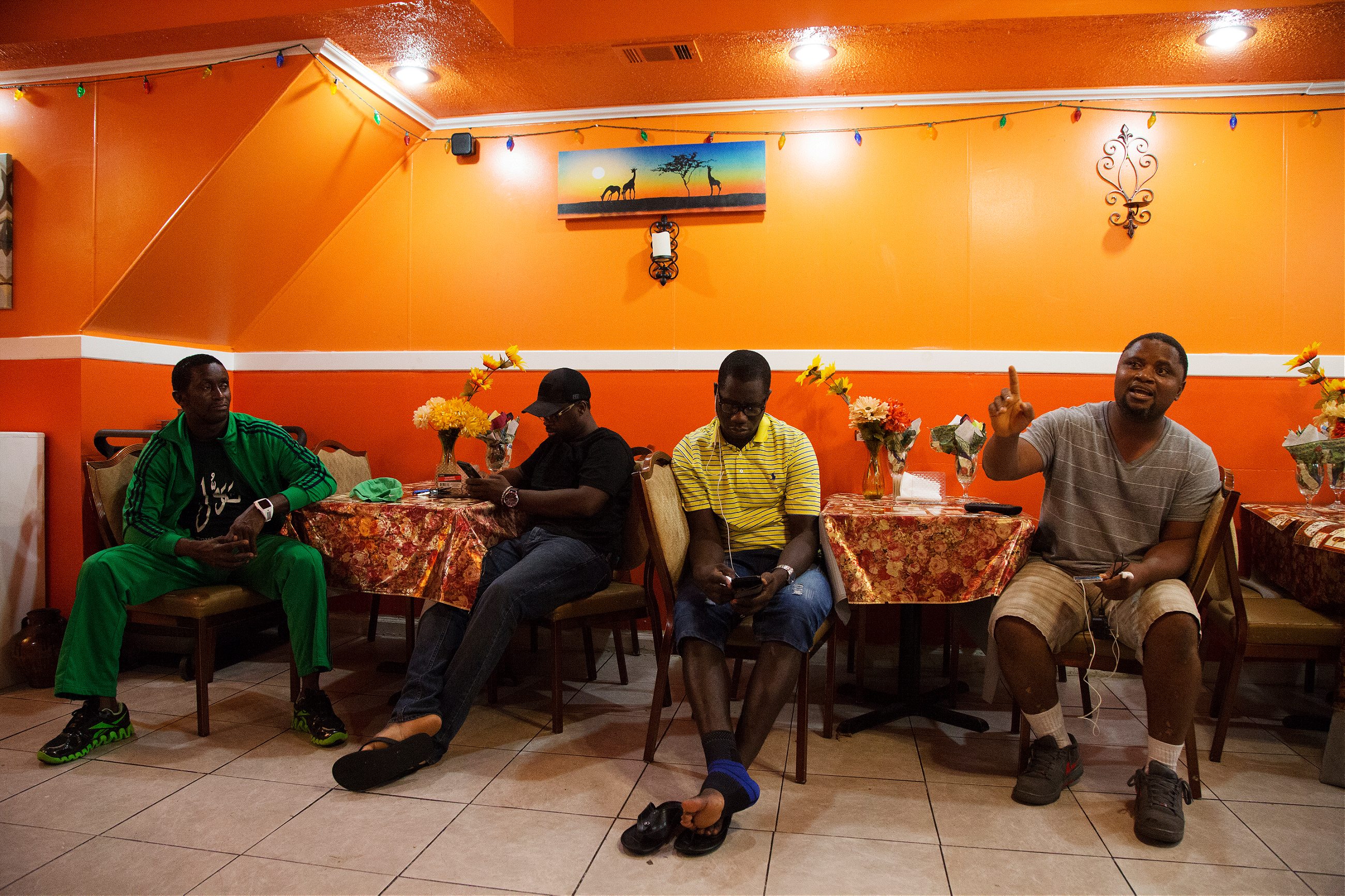
Since its opening in 2015, Tasty African Restaurant has become an important gathering place for Sierra Leonean immigrants living in Philadelphia, but it’s just one of the many African restaurants, grocery stores, and shops that dominate the 6500 block of Woodland Avenue, the heart of what is commonly known as Southwest Philly’s Little Africa. Though the neighborhood is largely West African, flags representing every country on the continent as well as the Caribbean hang from telephone poles. Travel agencies advertise flights to Dakar, Bamako, Monrovia, Freetown, Accra. After sunset, grills pop up along the sidewalk and customers line up to buy spicy kebabs called suya, a staple in predominantly Muslim West Africa.
“For the first time, we’re claiming a section of America for Africans,” says Voffee Jabateh, the Liberian CEO of the Southwest Philly–based African Cultural Alliance of North America. Though African neighborhoods exist in other U.S. cities, the city of Philadelphia has approved the endeavor, making it more of an official distinction. At his walk-up office above a shop on Chester Avenue, four blocks from Woodland, he points to a map of the neighborhood and outlines an area stretching from 40th Street all the way to the city limits, just beyond 72nd Street, covering about 10 square miles, on which ACANA has focused its community development efforts. ACANA organized the installation of the flags on Woodland Avenue and hopes to characterize the area as “Diaspora Village,” a name that Jabateh feels would be more inclusive of Caribbean immigrants and black residents than “Little Africa,” and that he hopes would help attract tourism. “Like Chinatown,” he says.
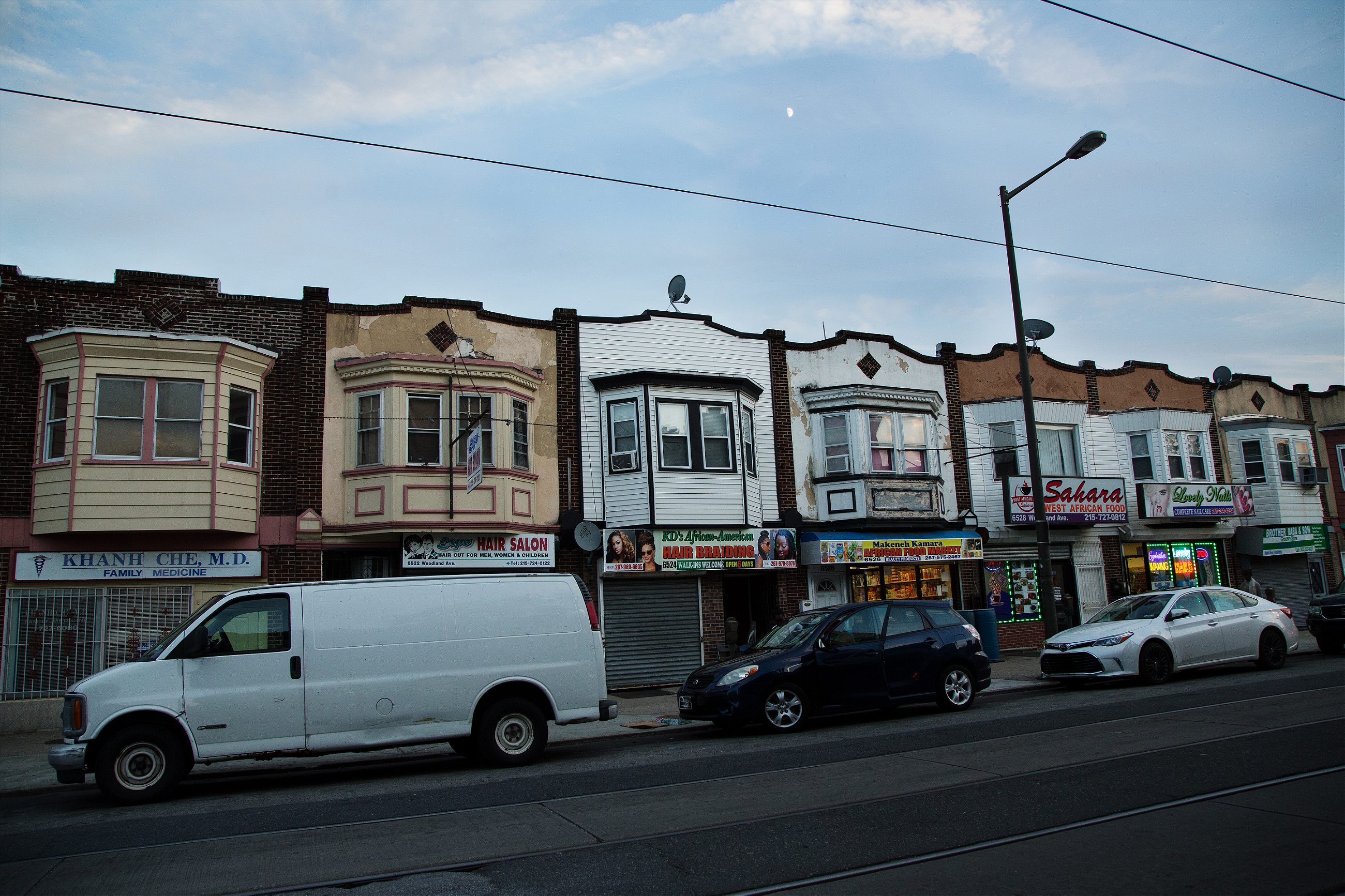
Though Little Africa is home to people from Senegal, Ivory Coast, Sierra Leone, and almost every other West African nation, the neighborhood likely wouldn’t exist were it not for the estimated 15,000 Liberians in the Philadelphia area, the single largest group of African immigrants in the city.
The relationship between Liberia and Philadelphia began as a movement back to Africa, a corrective to centuries of forced migration that had brought Africans to North America in the first place. Liberia was founded in 1822 by a group called the American Colonization Society, which supported the resettlement of free blacks to the African continent. Consisting of mostly white men, the ACS included some unusual alliances between slaveholders and abolitionist Quakers, the latter group having a significant presence in Philadelphia. Many black Americans and abolitionists opposed the idea, viewing it as a neocolonial scheme to protect slaveholding in the United States by ridding the nation of free blacks.
Beginning with its founding in 1816, the ACS raised funds to purchase land directly from locals along the African coast (according to other accounts, at least some of the land was, in fact, stolen). Four years later, emigration began with some 54 Philadelphians among the founding settlers. For nearly 30 years, the settlement operated as a colony of the privately-run ACS, then, in 1847, it declared its independence as the Republic of Liberia.
Official census data pegs the Philadelphia metro area as having the largest Liberian population of any city
The mass migration of Liberians to Philadelphia began more than a century later in the 1990s as Liberia collapsed into an extended period of civil war, which began in 1989 and ended in 2003.More than a decade of near-constant conflict resulted in at least 300,000 deaths and an exodus of refugees. Starting in the early 1990s, some of those refugees found their way to Philadelphia because, as Jabateh puts it, “we were welcomed here by the black community, the black churches.”
After the first wave of refugees, Philadelphia’s Liberian population grew to be one of the largest in the U.S. Estimates from community leaders and local media vary, but official census data pegs the Philadelphia metro area as having the largest Liberian population of any city, closely followed by Minneapolis, with large populations in Washington and New York City as well. By the early 2000s, the Liberian community in Southwest Philly was flourishing. Before long, immigrants from neighboring West African states like Guinea, Sierra Leone, Mali, Ivory Coast, and Senegal started settling there.
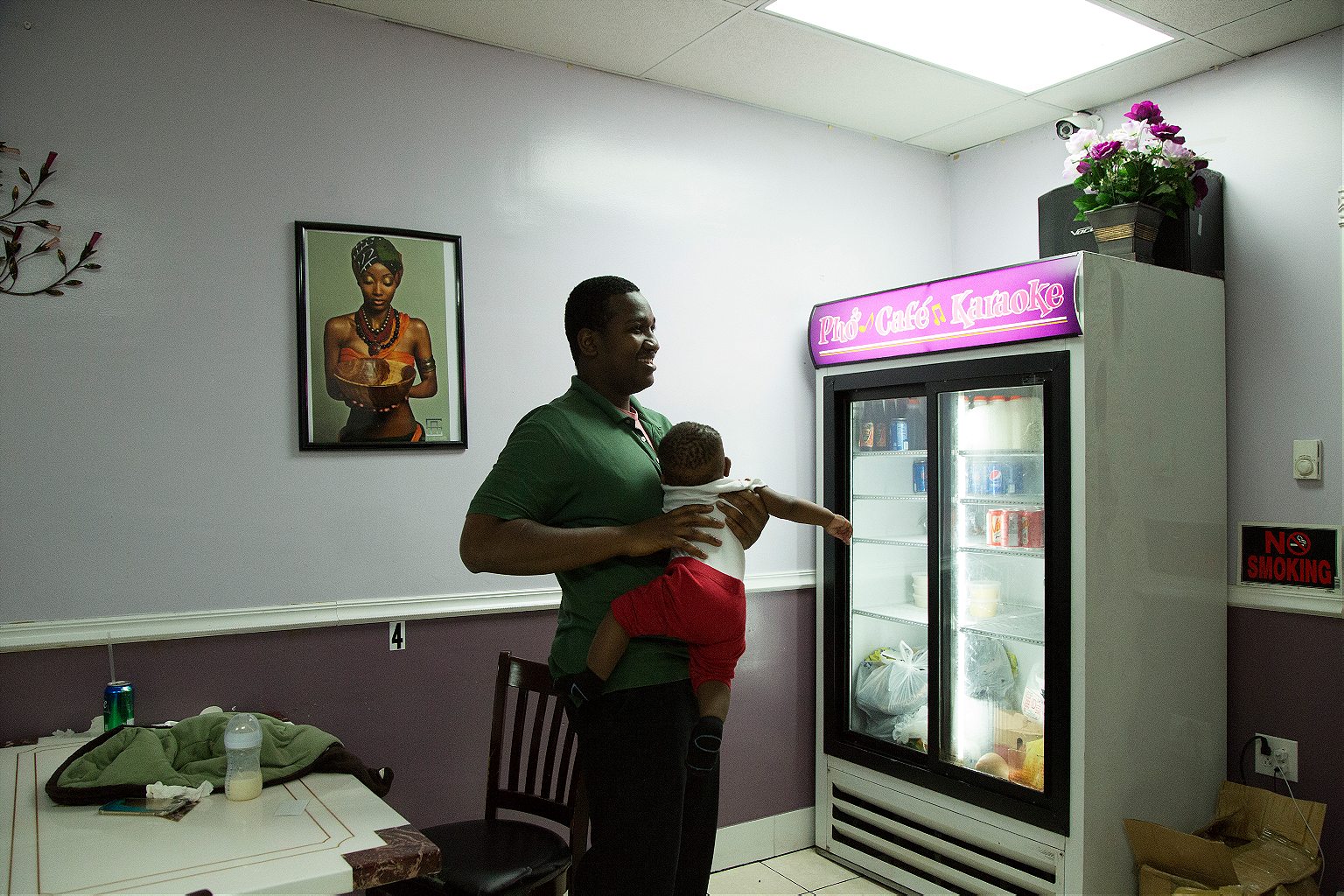
On a cold November evening, I visited Sahara Restaurant, run by Moussa Doumbia, who moved to Philadelphia from Mali 10 years ago. The dining room was mostly empty. Doumbia cradled his infant son while his wife took takeaway orders over the phone. A small Malian flag stood on the counter. “If you need something from Africa, definitely, you can find it here,” Doumbia told me.
West Africa is an incredibly diverse region, with multiple ethnic groups populating each of its 18 countries. Though similarities exist across culinary cultures, many identify strongly with what they perceive to be their “national dish.” Doumbia’s specialty, for instance, is zame, a Malian dish of rice cooked in spicy tomato stew and topped with vegetables or meat. “It takes time to cook,” he told me, a phrase I heard repeated in almost every West African restaurant in the neighborhood, a way to draw attention to the love and attention that goes into every dish, and a subtle criticism of American restaurants, with their fixation on efficiency and speed.
Though most restaurants are known for serving a particular nation-specific specialty dish, they also, for the most part, serve beloved regional staples like attiéké, a couscouslike dish made from cassava; fufu, a large dumpling of pounded yams, cassava, or plantains; jollof rice; fried plantains; and stews made from peanut butter or okra served with your selection of goat or whole tilapia, grilled or fried. West African street foods like kala (fried dough), peanut brittle, chin chin (crunchy fried wheat flour), and desserts like dege (sweet yogurt with millet) are as ubiquitous on Woodland Avenue as they are anywhere in Francophone West Africa.
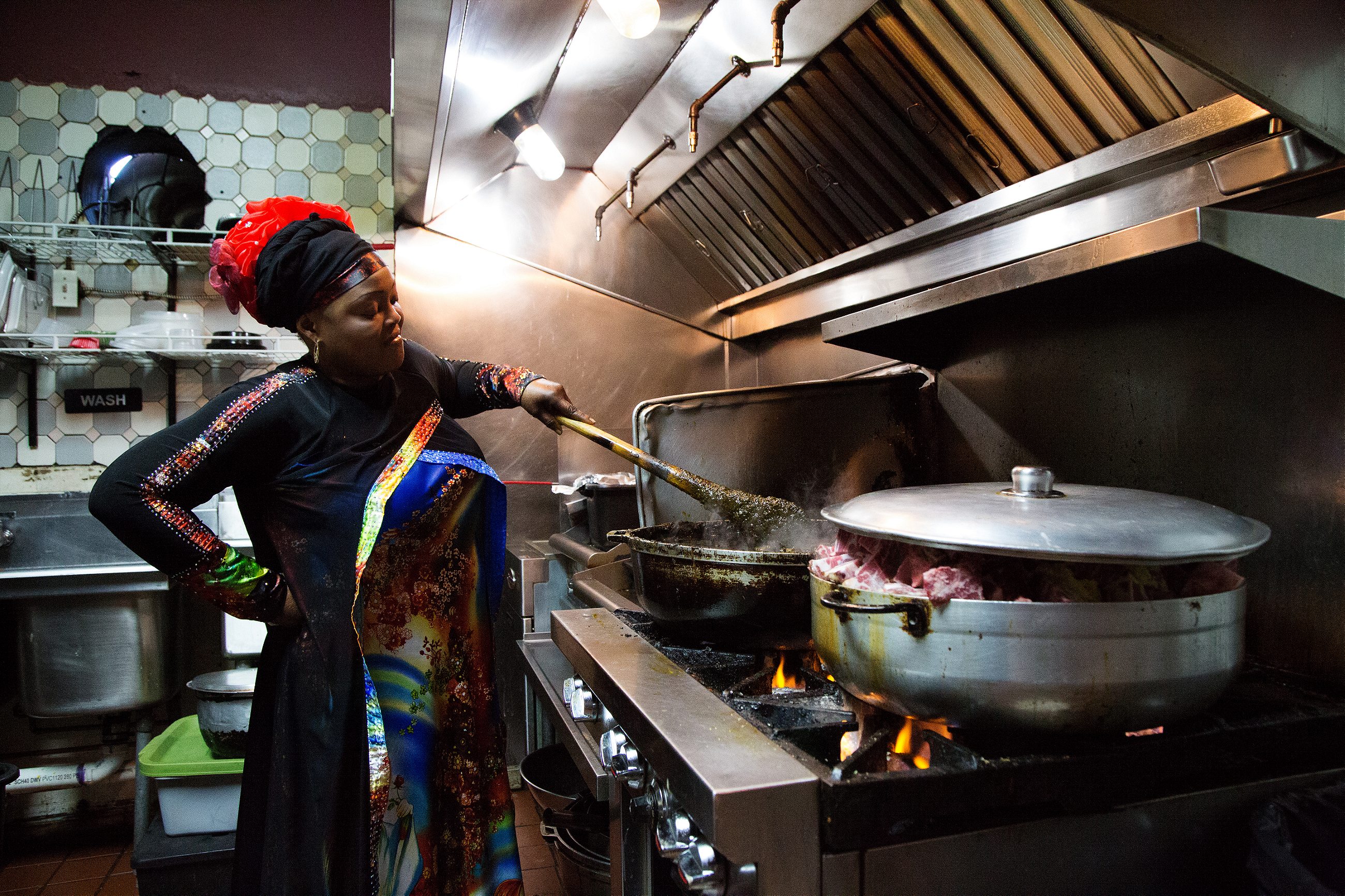
One of the neighborhood’s more popular restaurants is Le Mandingue, a splashy contrast, with its colorful sign and fairy lights in the street-facing window, to the more modest restaurants that dominate the area. Fanta Fofana, the owner of Le Mandingue, arrived in Philadelphia in 1996, having fled the violence back home in Liberia after her little brother’s death in the war. Upon arriving in the U.S., Fofana entered nursing school, but her studies were cut short when she lost her left leg in a car accident. After that she decided to open Le Mandingue, named using the French term for the Malinke ethnic group that lives in Guinea, Liberia, Senegal, Gambia, Mali, Burkina Faso, and Sierra Leone. Today, her clientele includes patrons from every one of those nations.
“Food is a way of bringing people together,” she explained when we met in February. “People can come and eat and be comfortable with each other.” Neighborhood regulars stop in constantly to eat or sometimes just to talk. “It makes me feel like I’m at home, a little bit.”
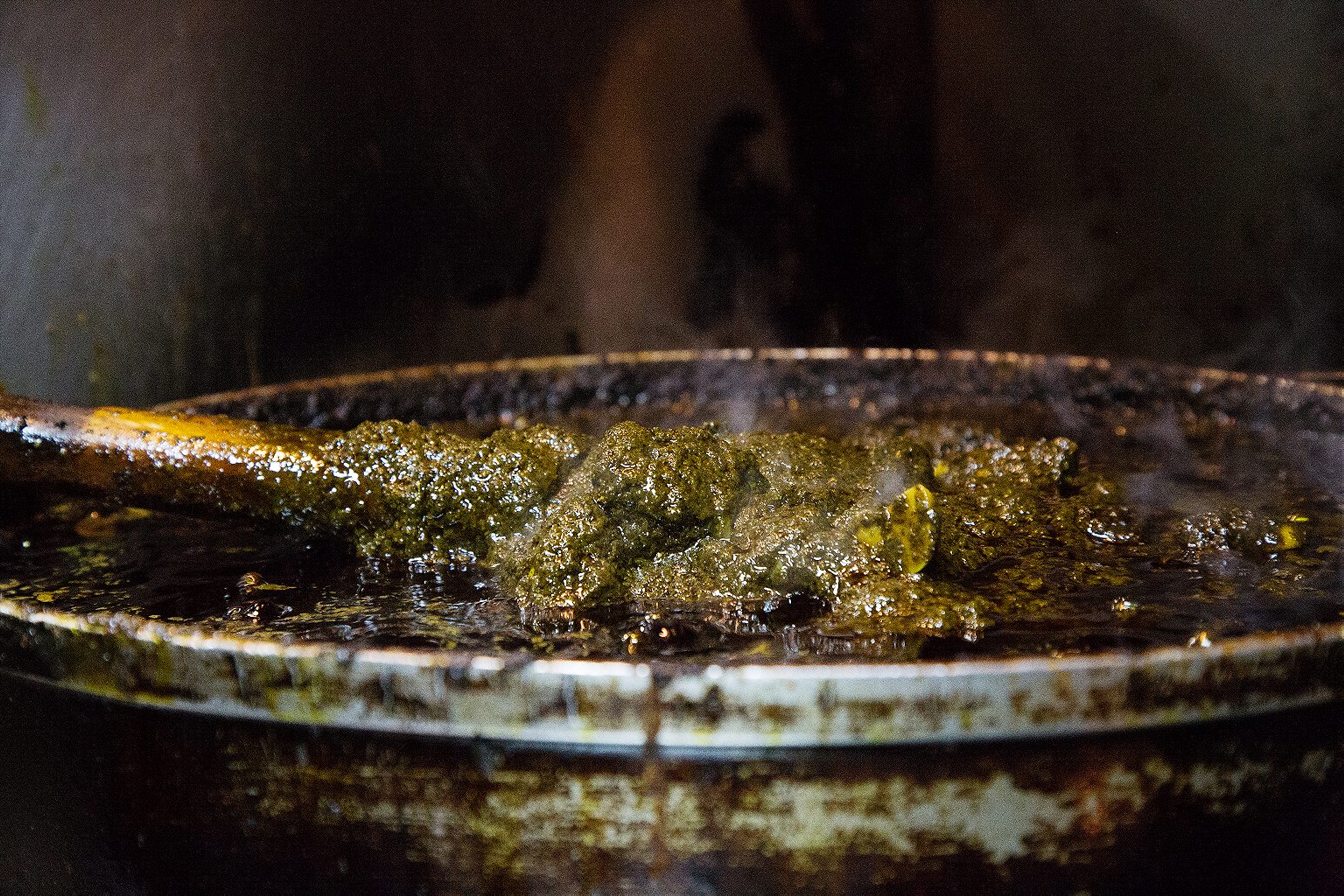
Since opening her restaurant 12 years ago, Fofana has staffed her kitchen principally with young, female refugees. The restaurant is frenetic as staff members race from the kitchen to the front of house, keeping an eye on a steaming pot of cassava greens while answering the constantly ringing phone and taking orders at the counter. Fofana works busily beside them. Only once in two hourslong visits did I catch a glimpse of her taking a break from the heat of the kitchen, sitting down to fan herself out of the customers’ line of sight.
Many of the ingredients used in kitchens like Fofana’s, Doumbia’s, and Tholley’s are rarely sold in traditional American grocery stores, which is where shops like Uncle Musa’s Grocery, nestled between another Liberian grocer and a Liberian restaurant, come in. Musa Barry, the store’s owner, imports containers full of ingredients directly from his hometown of Monrovia, Liberia’s capital, a time-consuming and unpredictable process. One afternoon, while unloading boxes of diapers from the bed of a truck, Barry told me that a shipping container had arrived at the Port of Philadelphia the night before. “But,” he said, voicing the neighborhood’s refrain, “it takes time”—meaning, in this case, to clear customs.
A week later, the container still hadn’t made it through. “They said it should be ready tomorrow,” he told me, not sounding entirely convinced. (It wasn’t.) He took out his phone and showed me a video of the previous time a shipping container arrived, panning between the storefront and the opened doors of the container, filled to the brim with jugs of West African palm oil.
Those jugs, like most of the goods Barry imports, started out at Red Light Market, one of the largest in Monrovia. One of Barry’s family members in Monrovia spends about a month buying goods to put in the shipping container, which has to be full, Barry says, so that he can maximize profits after paying for the container to ship. It takes another month for the container to reach port in New Jersey (“I don’t know the name of the port,” Barry told me with a shrug). From there, it comes by truck right to his shop’s front door. Barry would prefer to ship directly to Philadelphia to save costs. “We tried to tell the city of Philadelphia: There’s too many Africans here, we’re importing too much,” he says. “There’s a port here, but they’re not taking international shipping.”
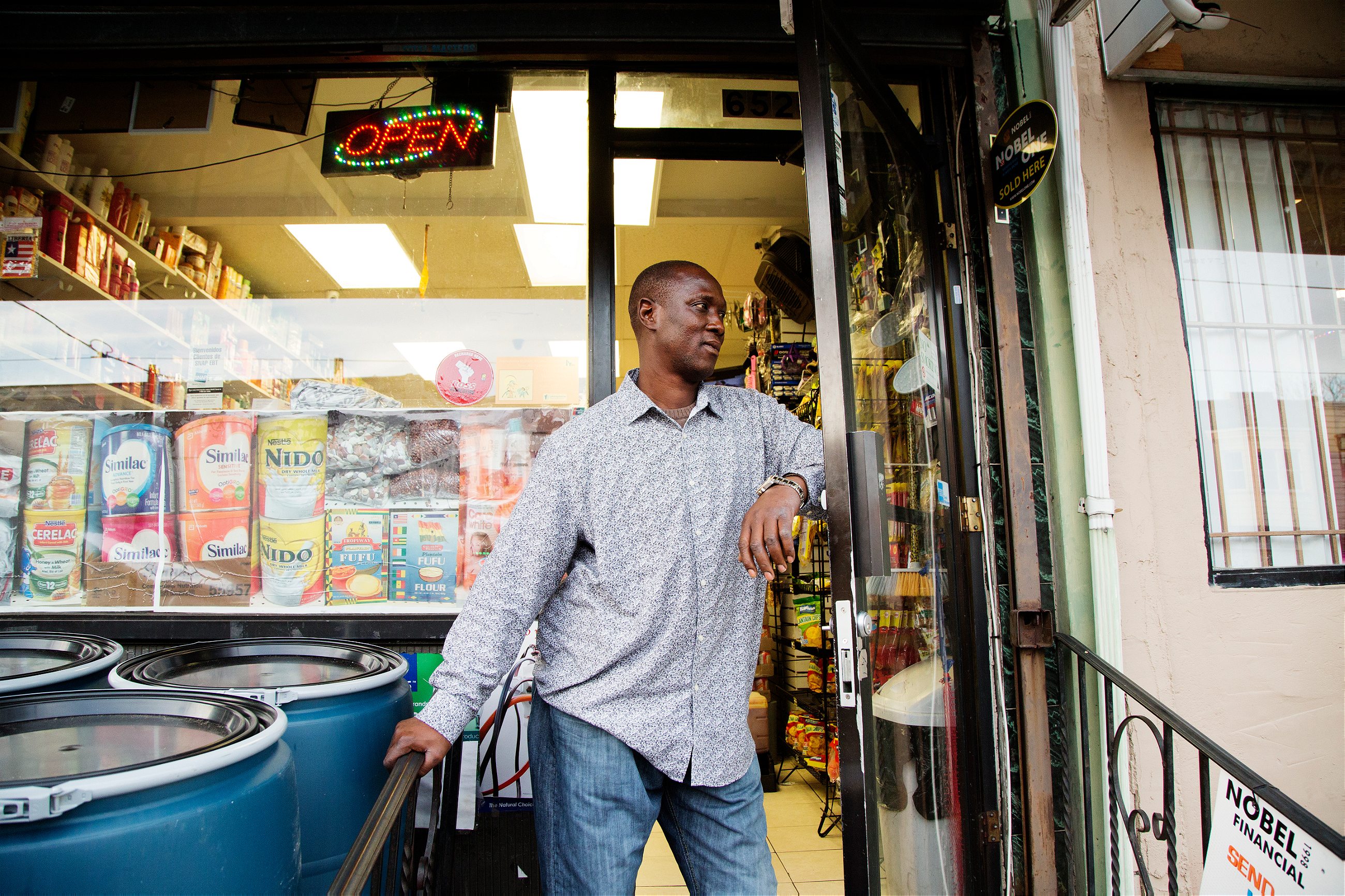
Not all the goods that Barry stocks come from Liberia, but importing from multiple ports would be far too complicated and costly for a small business. That’s why Barry and other local business owners have devised a system of sharing their goods. When Barry receives a large shipment of palm oil, he sells it on to other groceries and restaurants in the area. In turn, another grocer might import a surplus of yams from Ghana or fabric from Cameroon, and Barry will be able to buy some of that off of him, too.
Customers wander in and out of Uncle Musa’s throughout the day, and Barry greets most of them by name. “When I came in this country, I struggled a lot. I worked at a car wash and on a boardwalk in Atlantic City,” he says. Now he runs a total of four businesses in Philadelphia, including another grocery store and a clothing store.
On the day I visited, I met Richard Joh, from Liberia, and Joijoi Seye, from Senegal, stocking small tubs of palm oil on shelves in the back. Joh came to Philadelphia before there was a Little Africa. “I came here in 1989 and there were no African stores. Le Mandingue was a tuxedo store! I went to try on a tuxedo in 1994 for my cousin’s wedding. Now I go for African food.”
“People come from all over the place to buy food here,” Seye adds. “It comes from Africa straight to Philadelphia.”
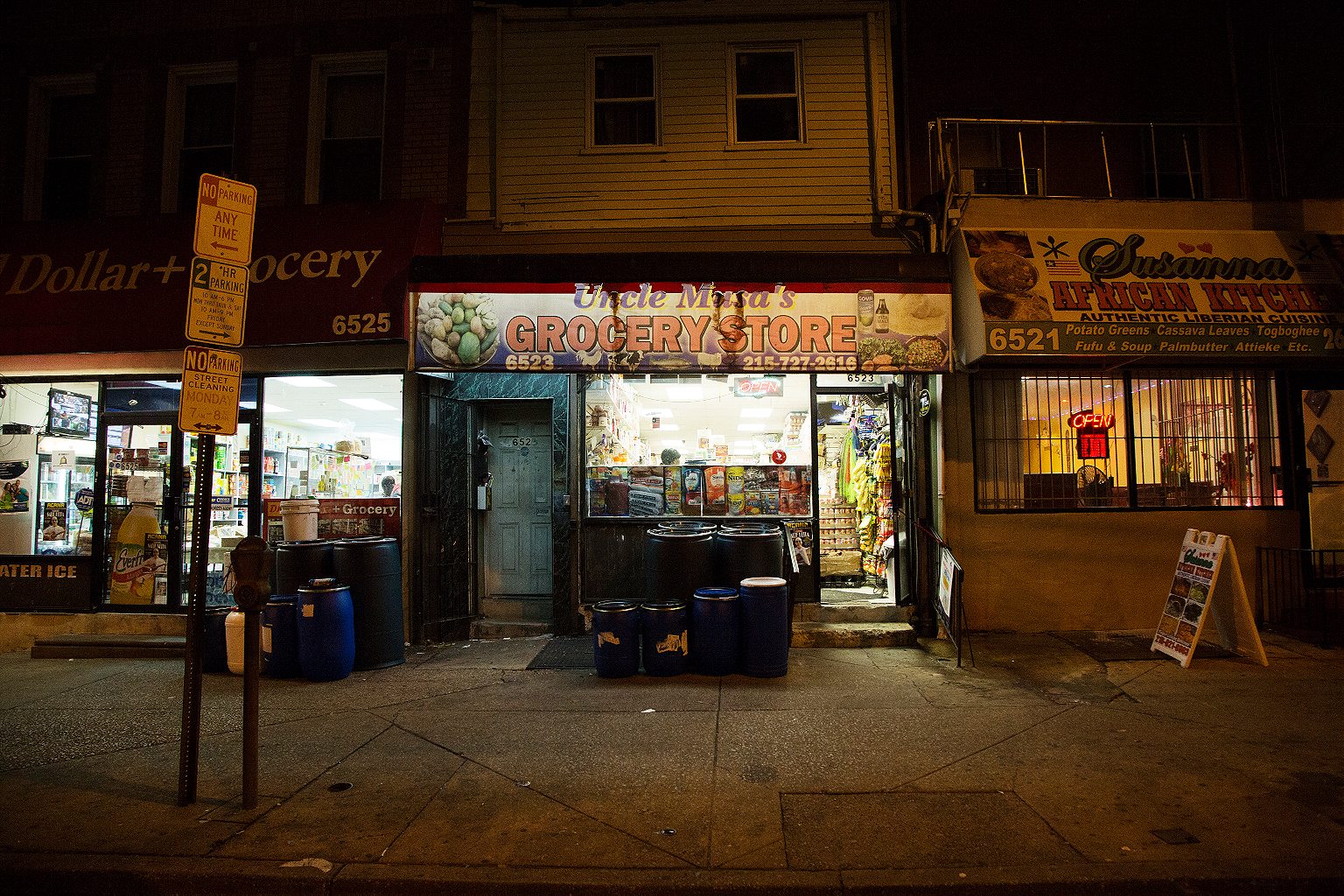
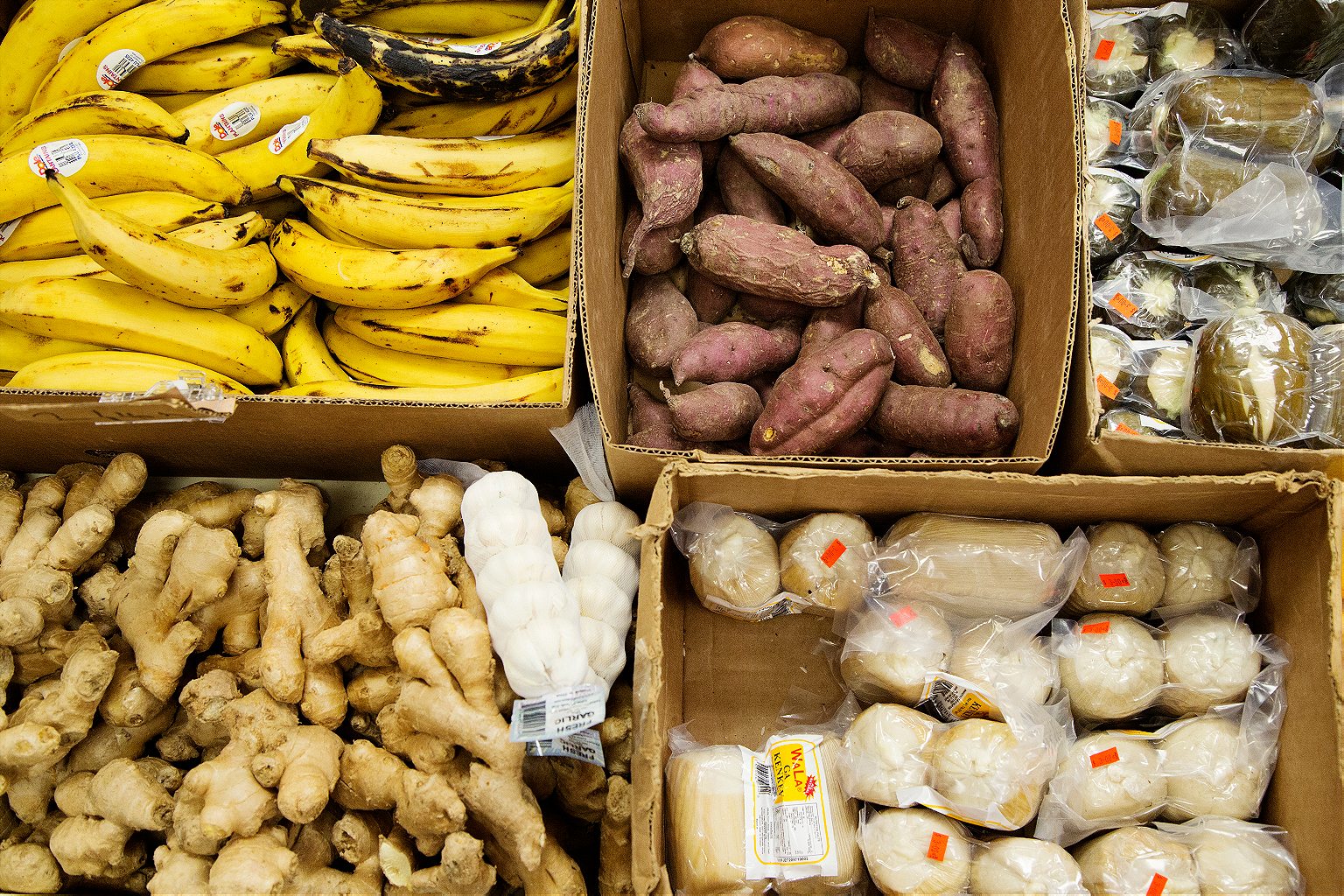
In those early years in the United States, Joh went on, “If you wanted fufu, you combined mashed potatoes and potato starch, and used spinach for potato greens. If you wanted to buy fish in the American grocery store, there was no head! I said, ‘Where’s the head?’ and they said, ‘You eat the head?’ When you’re raised on a certain dish, it’s hard to break away from it,” he said. “You always find a way, and that’s what Africans did.” He smiled. “We don’t have to do that anymore.”
Restaurant owners throughout the neighborhood told me, with a hint of pride, that more and more native-born Americans have come to appreciate home-cooked African food as a healthier alternative to fast food.
According to Ezzy Tholley and Mimi Kamara, Philadelphia’s thriving, largely black Muslim community, concentrated in neighborhoods like Southwest Philadelphia, has become a particularly important part of the customer base. Local Muslims seek out West African restaurants because the food is almost always halal—even if you are a Christian from Ghana, you may be serving a Muslim from Nigeria or Ivory Coast (Tholley and Kamara, for instance, come from Sierra Leone, where most of the population is Muslim). “They don’t eat at that other restaurant, they eat right here,” Tholley says.
Despite a diversifying clientele, most restaurants in Little Africa still rely principally on local customers to survive. The community that exists continues to produce a demand for traditional food of the it-takes-time variety. Only time will tell whether the city will embrace “Diaspora Village” like it does Chinatown or Korea Town or the Italian Market.
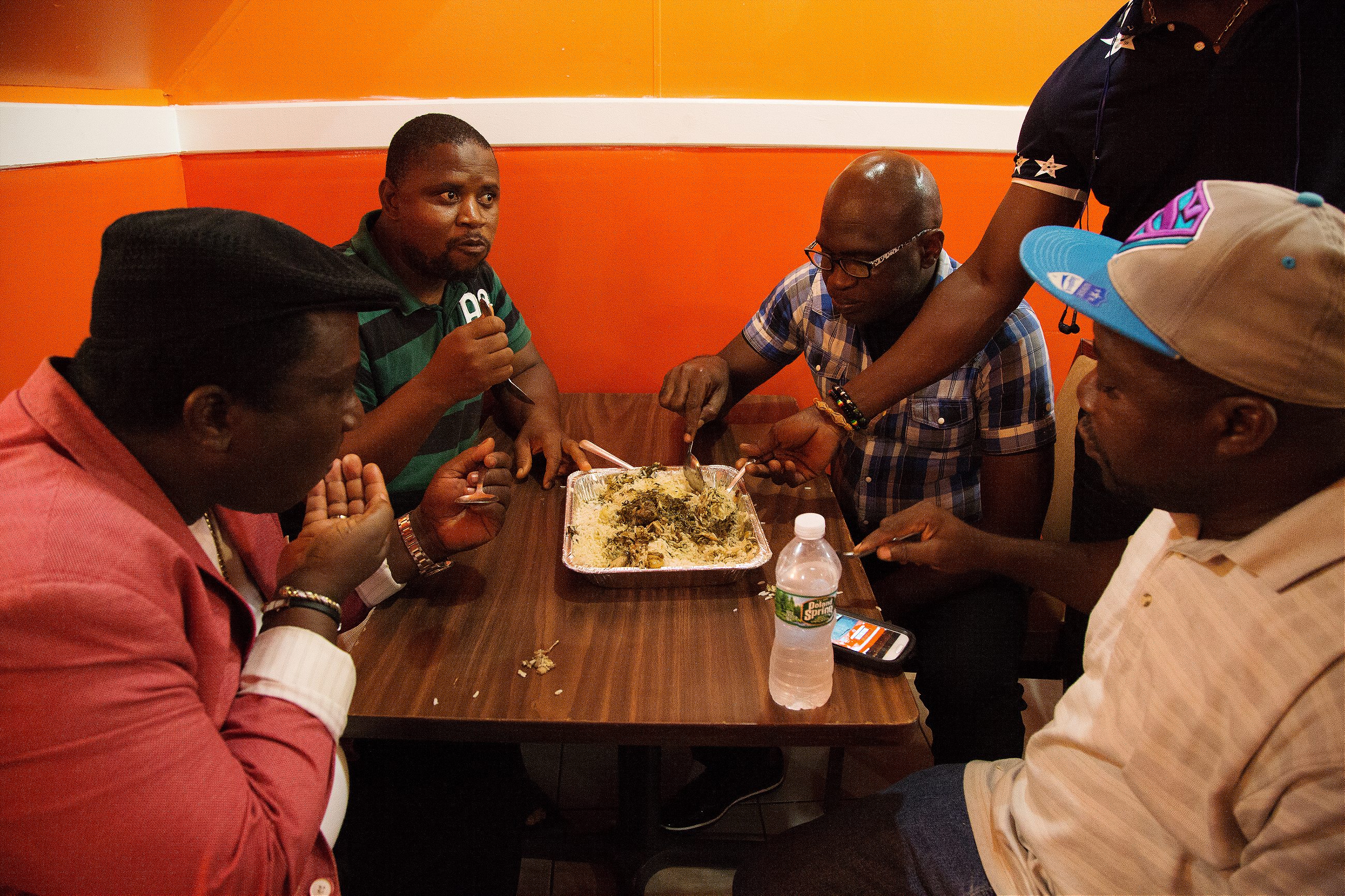
On a recent Thursday night back at Tasty African Restaurant, the winter had finally hit. It was dark outside, and just as it had been in the summer and early fall, the room was full of men discussing current events and women chatting with each other by the kitchen. Tholley stood by the cash register waiting for a plate of food—rice and okra stew, this time served with fish. “I fast every Thursday,” he told me, “and then, if I’m having a problem—I fast for three days, and pray to God.” He took a seat and offered me a plate, as he had every time I’d entered the restaurant over the past several months. “For over 20 years, Africans have been here,” he told me, then turned his attention to one of his customers, who, after all these years, was also more like a friend.
I watched as customers came in and out, many with young children in tow. On the wall near the back of the restaurant, there is a map of the African continent. Framed collages of different West African cities hang above the tables, depicting independence monuments, sunny streets, and colorful cityscapes. Though the next generation will grow up as American citizens, they will still come of age on their parents’ food, surrounded by images of their parents’ homes. Those cities may seem worlds away from the dark, narrow streets of Philadelphia, but the smell of onions cooking in palm oil makes the gap between them that much smaller.
